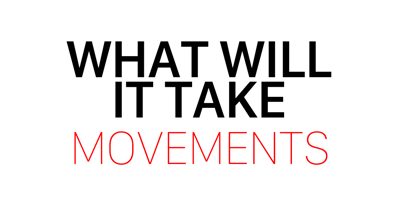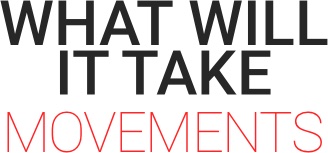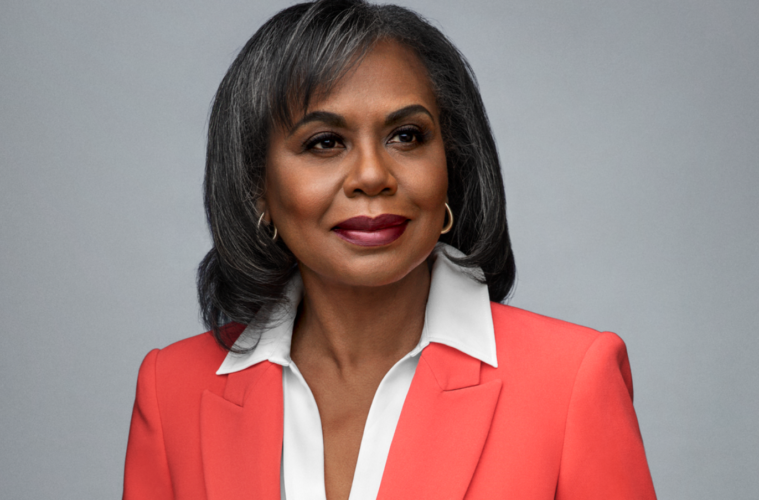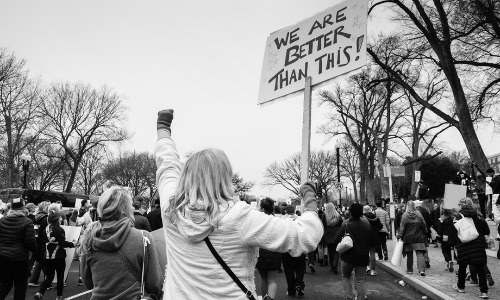By Marianne Schnall
By courageously sharing her landmark testimony during the Clarence Thomas hearings in 1991, Anita Hill became a trailblazer and leading figure for women’s rights in the fight against sexual harassment and gender-based violence. Three decades later, in the wake of the #MeToo reckoning and with mounting evidence that these issues remain pervasive and epidemic, Hill, who has continued to be a tireless advocate for these issues since the hearings, has written a new book, Believing: Our Thirty-Year Journey to End Gender Violence. In it, she shares new insights into her own journey and documents the devastating collective impact of gender-based violence, as well as the intersectional issues of race, class and power, which remain as urgent to address as when she first testified.
In Believing, Hill, currently a University Professor of Social Policy, Law, and Women’s and Gender Studies at Brandeis University, draws on her own story, as well as her experience as a teacher, legal scholar and advocate, as she chronicles the experiences of the thousands of survivors who have told her their stories and the many detrimental impacts it has had on every aspect of their lives (which ultimately spread to the lives of others). Hill offers her skilled analysis of the deeper issues that too often remain below the surface that have been preventing true progress from being made. She issues a powerful call to action for the cultural and systemic change that is needed in our laws, from our leaders—and from all of us—to address gender-based violence concretely, comprehensively and immediately.
This was my second time interviewing Hill, who always has so much wisdom and inspiration to offer and is a much-needed role model for women and girls to step into leadership and courageously use their voices, as she did during the hearings. With all the urgent issues we face, that is the kind of bravery that is most needed today—to boldly use our voices to stand against injustice and to be advocates and leaders for the causes we believe in, to co-create a more equal and just world.
In this interview, we cover a lot of ground, from the broader implications of gender-based violence, to how these issues are exacerbated for women of color, to how we raise our men and boys, to how she keeps herself positive and energized to keep doing this work and much more. Ultimately, there is a lot to learn from Hill about the change that is needed to make our society and systems safe and equitable, and how we can all be a part of making that change.
Watch the video below for an excerpt of the interview. To hear the full conversation, listen to the Shiftmakers podcast.
Marianne Schnall: Why did you decide to write this book now, and what are you most hoping that readers will take away from it?
Anita Hill: I’ve heard from thousands of people over the past 30 years, and their stories and their questions have been shared with me. And that’s really a huge responsibility. It’s one I wanted to answer. I really wanted to answer their questions, as well as to understand my own experience and where it fit in this whole era today of #MeToo and the Kavanaugh hearings. To just take a look at, has anything actually changed since 1991? And fortunately I came up with the answer that, yes, things have changed, but not nearly enough.
So I think it’s time to talk about and celebrate what has changed, including all of the movements that have occurred to support survivors and victims. All of the research that has been done by academics in particular, all of the advocacy, as well as, unfortunately, all of the new information about the breadth of this problem. Some of these things are encouraging, some are entirely discouraging when we start to look at the numbers, but all of it points to the fact that this could be a moment where, if these things come together, we can actually make some change that everyone will know. So you won’t have people asking the question, have things changed at all?
Schnall: Sometimes people don’t understand this issue if it hasn’t personally affected them in some way directly. So in addition to the harm that gender-based violence does to its survivors, what are the larger implications and impacts on a collective and societal level? Why should everybody care about this issue?
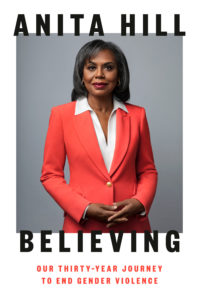 Hill: First of all, I think people don’t know that this has affected them. It’s almost as though it’s become so normalized that people don’t even know that problems are happening in their workplace or in some of the institutions that they belong to. It could be places of worship, it could be problems at the museums that they attend. And we’re starting to realize that just about every institution in this country, private and public, has been affected. It’s happening in our universities. And one of the reasons people don’t think that this is happening to them is, as you say, they’re not direct victims, but the science tells us that when people are victimized, it impacts all the people around them. So if we take, for example, bullying and harassment in schools, that shapes the minds of young people, even though they’re not the immediate victims. That’s impacting the lives and the future of these children. I give examples of that, including the one involving Mitt Romney when he was running for president a few years ago, about some behavior that his classmates remembered years after as really offensive and harmful.
Hill: First of all, I think people don’t know that this has affected them. It’s almost as though it’s become so normalized that people don’t even know that problems are happening in their workplace or in some of the institutions that they belong to. It could be places of worship, it could be problems at the museums that they attend. And we’re starting to realize that just about every institution in this country, private and public, has been affected. It’s happening in our universities. And one of the reasons people don’t think that this is happening to them is, as you say, they’re not direct victims, but the science tells us that when people are victimized, it impacts all the people around them. So if we take, for example, bullying and harassment in schools, that shapes the minds of young people, even though they’re not the immediate victims. That’s impacting the lives and the future of these children. I give examples of that, including the one involving Mitt Romney when he was running for president a few years ago, about some behavior that his classmates remembered years after as really offensive and harmful.
We don’t look at the economic cost as well. So when someone is being harassed in the workplace, for example, productivity is lowered, there’s absenteeism—and that affects all of the co-workers. Business reputations are lost, so it’s harder to attract good people to these locations, as well as retention. So we know economically there is a cost with individuals within the workplace, but there’s a cost to the larger economy as well.
One figure that is really startling is around intimate partner violence. One figure has it that 10 million people in this country have been victims, in some form or fashion, of intimate partner violence. And we’re talking about family violence now. Over a third of those people will become homeless. That has an impact on housing, on social services—it really does drain communities of resources. So those are some of the societal issues and impacts that have just been ignored because we just tend to think of these problems as personal and private problems, as opposed to problems that are affecting our friends and children absent in their schools or their colleges and universities and our workplaces, our colleagues and our neighbors throughout our neighborhoods—all of that really mounts up to a national impact.
And the one real national impact that I think we are ignoring is what’s going on in the military, the truly ghastly incidents that occurred at Fort Hood and the rates of violence there among the enlisted people in that community. That to me, when it comes down to it and we think about it, that kind of violence within our military forces is a risk to our national security, because when you put the enlisted people in harm’s way or don’t protect them against harm that you know exists, then national security suffers. Good people won’t want to enlist and good people will leave. And we know that from all of the reports. All of this tells us that we’ve got a problem that we have to get our arms around and measure, assess and understand.
And one more thing about assessment. There was a letter sent to the Government Accounting Office, about the cost of sexual harassment in the workplace sent by senators Warren, Patty Murray, Senator Feinstein, Gillibrand, all joined together: “Tell us what the economic cost to business is.” And the response was, “We don’t have it calculated. We know that there are problems with productivity. We know there are problems with retention. We know there’s waste that comes from so many suits that have to be filed and resolved, but we haven’t really put the numbers together.” That’s really a shame. We should know that. The government’s first poll about sexual harassment in the government alone was done in 1983, I believe. And we still don’t know how much it’s costing us? So those are the things that I think we need to be aware of and say, why isn’t this a priority? Why isn’t it a priority for our government? Why isn’t it a priority for our businesses?
Schnall: I think the deep dive that you do in this book is so important and also how you look at everything with all the layers and intersections. And we know how many issues and problems are compounded when you take race into account. How is this problem of gender-based violence different or exacerbated for women of color?
Hill: In two ways. First of all, we know that the rates are higher, and we know that the reporting is probably not as high. I think that’s a result of a couple of things. One, there’s a sense that, especially if people of color or women of color are bringing complaints against someone else who is a person of color, then there’s a hesitancy to report because of bringing down the community or impacting the career, if you’re in the workplace, of someone who is from your community and hurting the kind of inclusion that we’re trying to bring to workforces. So that’s one thing. And we also know that making a complaint against one, that can lend itself to stereotyping: “Well, that’s what ‘those people’ do.” And so there is that danger, a sense of self-silencing because of that.
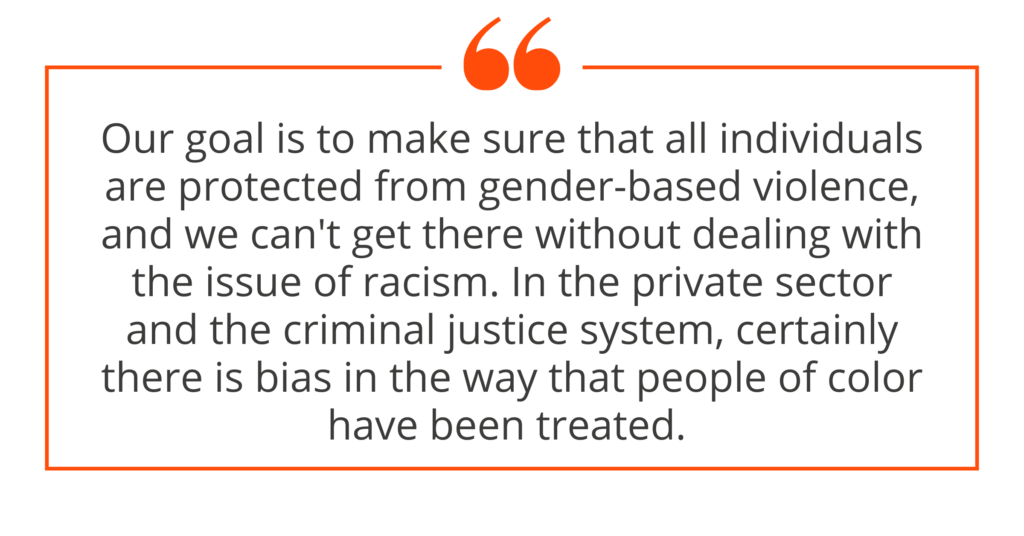 The other issue is that many of our systems—and this is a systems problem—have just been so racially hostile, historically, that people don’t trust that they’re going to be treated fairly. And the research shows that, as well, that white victims and survivors fare better than people of color within the systems that we have. That doesn’t mean that white women are doing well either. It’s just that there’s this added burden when you bring race or sexual identity into the equation. The systems are not built for any of us. But they also have to be checked and assessed and measured for how they are perpetuating racism as well. And I think business hasn’t really taken that into account at all. And unfortunately the government hasn’t either.
The other issue is that many of our systems—and this is a systems problem—have just been so racially hostile, historically, that people don’t trust that they’re going to be treated fairly. And the research shows that, as well, that white victims and survivors fare better than people of color within the systems that we have. That doesn’t mean that white women are doing well either. It’s just that there’s this added burden when you bring race or sexual identity into the equation. The systems are not built for any of us. But they also have to be checked and assessed and measured for how they are perpetuating racism as well. And I think business hasn’t really taken that into account at all. And unfortunately the government hasn’t either.
Our goal is to make sure that all individuals are protected from gender-based violence, and we can’t get there without dealing with the issue of racism, because whether we’re talking about the private sector systems or the criminal justice system, certainly there is bias in the way that people of color have been treated. And until we can root that out and address that, we can’t expect that people are even going to come forward, much less get a fair opportunity to be heard. I hear from young women of color who say they cannot complain because they don’t want to shame the race, but I also hear from young men of color who want to be partners and allies in this circle, but their fear is the stereotyping. So what is happening is race is really weighing down this conversation in our community. And until we can address racism as part of the problem, then we’re not going to be able to elevate the community.
Schnall: Absolutely. There are some things happening in this moment, like what’s happening with women and girls in Afghanistan, that got me thinking about these issues globally and what goes on around the world: honor killings, child marriage, female genital mutilation—all of these different issues. What does that signify to you on a global level? And what does it say about the state of our consciousness and the evolution of humanity that women are still treated as inferior and don’t have equality, safety, or equal participation?
Hill: When I wrote the book, I did decide that I was going to focus on what happens in this country, because I think in order to really address what’s going on around the globe, as we become part of what is happening to women in Afghanistan and women in other countries where they’re experiencing extreme oppression, we’ve got to clean up our own house. I mean, we have to be an example. When Brown v. the Board of Education was decided, there was an Amicus brief that was filed saying we’ve got to end segregation. And it was filed by the Department of State because they said, this is a black mark, no pun intended, on this country. If we can’t fix our problems of oppression in this country, we can’t be a leader around the world. And that’s why I’ve started with home. We’ve got to clean up what’s going on in this country, and we’re not close to there yet.
But what we do know is that some of the same things that keep women oppressed abroad, it’s the same kind of thinking that’s been built into our own systems—that certain men, for example, important men, men who make money [can get away with things]. I give the example of a professor in an academic institution that brings in lots of grants and lots of contracts and supports the school’s programs. That person can get away with things because money is a priority and it’s a scarcity in these locations. And what that says is that we value women less than we value money and institutional reputation that we are leading in certain research areas. And that’s evidenced by statistics as well. So we’ve got to figure out what our priorities are. Are we going to prioritize institutional reputation? Are we going to prioritize money coming in from foundations or the government, or are we going to prioritize what I think is our most valuable assets, the human beings who are being put at risk not only for their education but for their health and well-being inside these institutions?
And that’s exactly what’s happening in other places. When we fail to value women, then the systems allow abuse, they protect abuse. One example is what we saw with the situation of Michigan State and Larry Nasser. You had the FBI really turning their backs on claims that were brought to them by victims, the Olympic gymnast athletes. For whatever reason, the FBI just dismissed their claims, even though there was a credibility of the numbers of complaints that we’re getting, the stories that they were being told were just wretched. They dismissed their claims, prioritizing maybe Michigan State’s position or reputation, or maybe they were prioritizing Dr. Nasser. In fact, one claimant specifically that I talk about in the book, a young woman claimed to the local police, and the officer in charge there said, “Well, you know, we had this woman making a complaint versus this well-known physician, so we just gave him the benefit of the doubt.” What does that say? That means we are not valuing women. We’re not valuing women’s words, and we’re not even valuing them enough to put in place systems that allow them to be heard, give them a chance to be heard. So that’s at the core of what I think the reform has to be. It won’t work the same throughout the globe. We can’t go in and impose our own culture on everyone, but we can work to understand, how are the systems working there? What cultural factors are allowing them to put women at risk or harm? And how do we change the course of lives abroad, knowing that the problem is a combination of cultural problems as well as systemic problems?
Schnall: In the book you talk about how you likened being flooded with the letters and accounts from survivors after you testified at the Clarence Thomas hearings to the millions of people offering their stories after the #MeToo movement went viral. Would you have expected, 25 years later, to have been farther along? And even though, as you said, we’re making progress, why do you think it is so slow? What is it that’s delaying real progress here?
Hill: Well, the problem is vast. We know it’s vast and it’s systemic and it’s culturally based. We don’t like to think of that in our country because we compare ourselves to other countries that have, you know, honor killings, and we think, “Okay, well, we’re not that country.” But the devaluation of women is still culturally based and it’s built into our systems in the same way. And people look at it and say, “Oh, it’s like boiling the ocean. How are we going to deal with it?” We also try to privatize it and say, “These are personal issues that people are having. This is not anything that hurts the public.” So it allows us to just not do anything.
But also, there is a certain level of denial, and some of it is outright denial. You have people like George Will, who has said that the statistics about campus rape are sort of made up and are some kind of feminist agenda to claim victimhood. So you’ve got those kinds of denials, but then you have the denials of people who want to minimize and say, “Well, the behavior is not that bad. It’s not so bad that we want the law to intervene.” And we have that even in our court cases today where some egregious behavior, physical, as well as verbal, has been dismissed as stray remarks, as opposed to violations of our civil rights.
One really heartbreaking story, and this isn’t in the book because I just read it this week, was about a little girl, it was from Girls Inc., and it was a letter about why Title IX is so important to protect students from sexual harassment. And this little girl writes, “My first experience with sexual assault was in first grade. I told the teacher on him, and she took away my recess to punish me for being inappropriate.” So what we have done is we’ve allowed what in this case would be called retaliation.
The work that we’ve done with the Hollywood Commission shows us that there are still three reasons that people don’t come forward. Now, first of all, let me just think about this little girl. Do you think she’s going to now be willing to come forward if something else happens or something even more egregious happens? It’s already shaped in her head that she will not be taken care of, and the fact that she’ll be punished. So now when we do our research on entertainment workers, and what their sense is about accountability for the problem, what we find is that they don’t come forward. One, they feel they won’t be taken seriously and that there will be no action taken. Two, that they will be retaliated against, like this little girl was, for coming forward. And three, that somebody will do an investigation and find that there was a problem, but nothing will happen to the person because that person is more powerful than they are. So what we still have is, I call it almost like a pipeline of grooming people to tolerate abuse, and it happens to the victims, but it also happens to abusers because they’re being groomed to expect that their abusive behavior will be tolerated because it has been in the past.
Schnall: You were just talking about the role of men. I think it’s also really important to talk about culture and how we raise men and boys to perpetuate this behavior—that this is how you act if you’re a man. How do you see that fitting into the equation in terms of these kinds of really constrictive, damaging notions of masculinity, and what can we do to change it?
Hill: The counterpart to saying that men, in order to be men, have to be aggressive and controlling is that women are expected to be passive and accepting, no matter how bad the behavior is, and then they’re supposed to accept the idea that it wasn’t that bad. So I think what that does is, it leaves both parties at risk. And unfortunately, we don’t talk about the risk that men take by not conforming to this concept of hyper-masculinity, the risk that they take by not being that kind of guy, that man who’s willing to duke it out. And the man who is willing to show emotion is penalized.
I give some examples [in the book] of Jonathan Martin and Richie Incognito of the Miami Dolphins. I go back to some of these instances, like Mitt Romney as well, with new insight on what is happening. And basically, the Mitt Romney incident and the incident with the Miami Dolphins football team was controlling the behavior of an individual to make them conform to really dangerous and toxic kinds of ideas about what it is to be a man. And that can result in violence against men. One in every six men or boys say that they have been sexually violated, and it’s typically from other men, not always, but typically. So we have to examine our own concepts of masculinity and gender roles and the kind of behavior that we accept in men, which is certainly much more abusive behavior in men than in women. I’m not trying to say we should elevate the level of abuse we expect from women, but we have to check their level of abuse in the name of masculinity that we accept in men.
Schnall: You alluded to this earlier, when you were talking about women sharing their stories and stepping up and using their voices. I’ve always thought that you are such a powerful example of that. In our previous interview, you told me, “If I don’t act, then I will have been a part of something that I don’t want to live with.” And when we’re talking about culture and how girls and women are really cultured to please and be liked and to not make trouble—what would you say? I feel like now is a moment where we really do need girls and women—and all people—to be courageous and use their voices. How did you find that in yourself? And what advice would you give on not worrying what other people think and speaking your truth and fighting for the change you want to see?
Hill: Well, I was in a very unique position of coming to this point. So part of the title of the book is a “journey.” It’s also about my journey to get to where I needed to be to be able to understand what my voice was and how I could use it in a way that was authentic and true to me. I think that is one of the things that people have to be able to start with: a sense of who they are in their own self, in their own strengths, and not try to make themselves into something else. Because that’s the example that you have: a firebrand advocate who makes fiery speeches and can bring a crowd to their feet and lead people to movement.
I knew that wasn’t going to be me, but I also knew that I had some unique skills: I had a law degree; I had a background in teaching, bringing messages and information to people; I had the luxury, honestly, of being able to put myself at risk because I didn’t have children that would also share that risk, because there is actual danger in speaking out. So I had a lot of things going for me, but what everybody does have going for them is their truth. They have their truth going for them, and they probably have many other things going for them. Maybe for some people it’s their real sensitivity and empathy for other victims, and they can bring people into the conversation through that. But whatever it is, use that. It doesn’t have to be a high-level platform or public platform. It can just be a platform among your friends. So tell somebody; it doesn’t mean file a complaint. And I say it doesn’t mean file a complaint because our systems still don’t work, and many of them aren’t intended to work for us. So I can’t tell everyone to put themselves at that risk, but I can say that it is affirming and empowering to know that your story has helped somebody else in some way.
Schnall: Which yours certainly has and continues to, so thank you for that. You were just talking about how our systems don’t work, and this is another thing when I interviewed you that always stood out to me. I’d asked you what some of the most important ingredients for leadership are and you said, “I think that most important is the ability to connect with the problems of people who are not like you, who have been underserved by government, historically, who don’t enjoy the privileges that you do.” In your book, you write about how we need to see how all of these different identity factors—whether it’s race, class, sexual identity—can influence a survivor’s experience of gender violence and how misogyny, racism and homophobia are at the heart of gender abuse and aggression. Can you talk a little bit about that?
Hill: I’ll just tell a quick story. I was giving a talk at one event, and the next day I got an email from a man who, because I had mentioned abusive men, said, “Thank you for mentioning men because it hardly ever happens in these conversations—what happens to men is not taken into account.” I do not believe that we can’t solve this problem without taking that into account and understanding its relationship to what happens to women. So that’s one of the ways. I think we’ve got to deal with some of these really, really high numbers of what happens to different groups. The murders of trans people, and a majority of them being trans people of color.
We’ve got to understand about Native American Women. I was in Utah one year at an event and these two Native American women came up to me and said, “We drove for hours to get here. Can you help bring attention to the problems that Native women are having?” And there’s some really good research and researchers and advocates on this. Sarah Deer is one of them, and she is a Native American, the Muscogee Creek tribe. So I don’t want to claim to be a spokesperson, but I can tell you that the numbers are horrific, that over 50%, and in some cases as high as 60% or 70% of Native women will be sexually assaulted at some point in their lives.
And you talked about some people feeling like it hasn’t reached their community. Well, in the Native community, it has reached everybody—and different tribes have different experiences. And what we also know is that a huge majority of those by some calculations, even the Justice Department’s calculations, about 90% of those assaults and violence against Native women are committed by non-Native individuals, non-Native men in particular. So we’ve got to understand all of this.
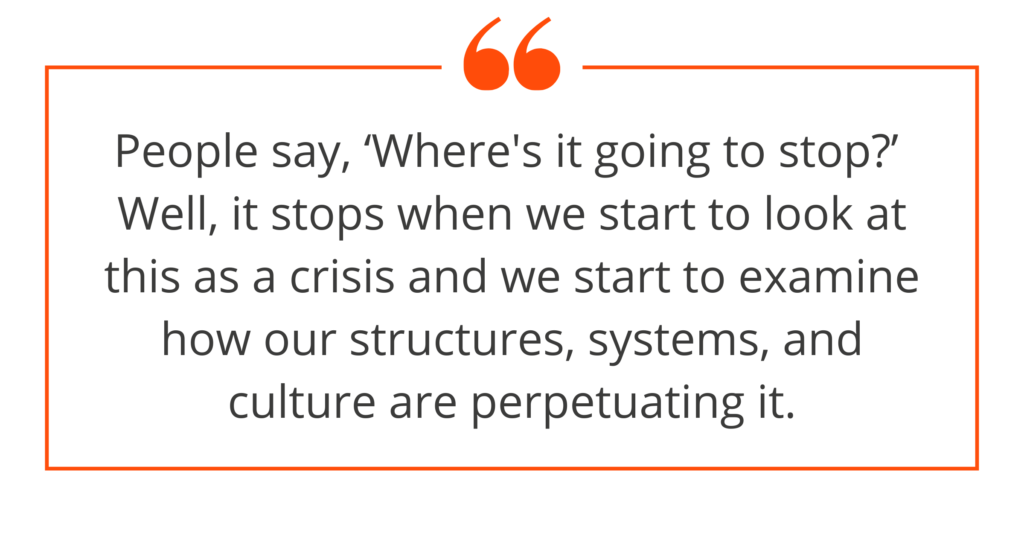
These are the things that need to come to light. They need to be part of this big public discussion. They need to be part of our understanding of this problem as a public crisis, as opposed to isolated events or unrelated behaviors. We need to look at this as a whole. People say, “Where’s it going to stop?” Well, it stops when we start to look at this as a crisis and we start to examine how our structures and our systems and our culture are perpetuating it.
Schnall: How does the way we think about power need to change? Because when I’m hearing everything that we’re talking about on all these different levels, it seems like a part of the issue is who has the power, who has the voice. And that’s part of why we have to change those types of paradigms.
Hill: Systems allocate power. And we have systems that put almost all of the burden of coming forward, proving their case, all of the presumptions, against victims. Whether it’s in the criminal system or the civil system or private systems—those systems have allocated power to abusers, they have given over the power to abusers. In many court cases, when they talk about abusive behavior being stray remarks that the law shouldn’t be involved in, they’ve allocated power to abusers. And we need to think of it in that way. So this is about power at every level. If you think about how in a workplace or in a school, you can have all the rights in the world, but that can be taken away from you by one instance of abuse. That right to an education can be taken away. How many people have changed their majors or left a school because of their experience that was never accounted for, even though they pursued it through the system? So we do have to think about where the power lies and how to balance that power so that we’re not continuing to perpetuate harm.
Schnall: There’s so much going on in the world right now. With all that must frustrate, concern and anger you, how do you keep yourself hopeful and centered and energized to continue to do this work?
Hill: There’s power in the struggle, I guess. And because I know I have a community. I know I’m not the first person to be involved with this work. Rosa Parks was involved with anti-violence against women work. I know I’m not alone today because I know that there are so many advocates out there that have grown and become powerful since 1991 even. And that keeps me from being discouraged, honestly; it just keeps me from giving up. It gives me the energy I need. I hear from people who really need this to happen—that keeps me energized, it motivates me.
And also I draw on my family history. I think about my mother and her mother, and in two generations how much change has occurred. So I know change is possible, and you have to really believe change is possible. I really believe change is possible because I’ve seen it in the lives of my family. I’m the youngest of 13 kids, so my siblings were raised and came of age in a different era. My oldest sibling is 93 years old, so 30 years was like a different era. I grew up around the time of Brown v. Board of Education, and that’s different from growing up around Jim Crow. The Civil Rights act, protecting against race and gender discrimination was what I grew up with. They had none of that. So all of those things really come together. And then a lot of prayer and some yoga and other things actually go into it. But it doesn’t mean that I don’t get angry or discouraged, but I have found ways to rebound and stay focused.
Schnall: That’s just so beautiful. With all the progress that has been made, it’s hard not to acknowledge things like what just happened in Texas and that Roe v. Wade is endangered and the Violence Against Women Act is under threat of not being extended, or even just the setbacks to women in the workplace with the pandemic because we don’t have a good caregiving system in place. What do you make of what’s happening now? What most concerns you, and what do you think we need to do?
Hill: I think every one of those things that you name, there is violence or aggression in one form or another against either the rights of women to their own bodily sanctity or to their political participation in some cases. So I think we really need to understand how all of those things are really tied to just basic safety and well-being and respect. And that’s where I start from [in the book]. What does each of these things say about how much we value women to have control over their lives, as well as what we say is equal justice and opportunity? And part of that comes from being a lawyer, but also it comes from, as I said, growing up in a time when we were just figuring out what equal justice for all meant and thinking broadly about it—all of those areas were supposed to open us up for more opportunity and a bigger sense of justice.
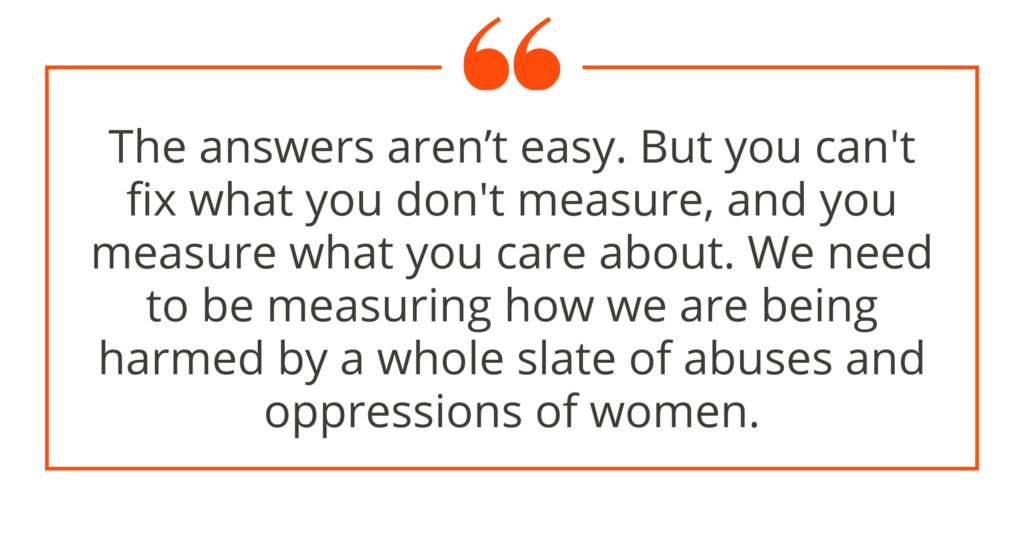
In the book I also look at all of those things you’ve mentioned and all of the disparities that happened during the COVID pandemic that continue to exist. Even the surge of violence within homes that occurred—all of it. I look at, what can we do to expand protections for people against these harms that come to them, whether they’re the harms from legislation or harms from something like the pandemic? And that’s why I think the answers aren’t easy. But as I say, you can’t fix what you don’t measure, and you measure what you care about. And we need to be measuring how we are being harmed by a whole slate of abuses and oppressions of women. So right now I’m focused on the subjects that I bring up in the book, then the behavior that I talked about in the book, but it doesn’t mean that I’m not mindful of all those other things, as well.
Schnall: We hear a lot about supporting Black women and gratitude for the activism and political power of Black women, but that hasn’t necessarily translated into equity or actual power. What do you think needs to happen in order for that shift to take place so that it isn’t just gratitude but actual power and influence?
Hill: We talk about political rights, and now the focus of the conversation is on voting rights. That’s really important, but what we also need to be mindful of is, how do our governmental structures and our political structures neutralize the effectiveness of rights? The fact that the Violence Against Women Act is not being passed. The fact that we know that women of color, Black women in particular, are at a higher risk for it, so they would benefit even more from a rigorous Violence Against Women Act protection by the federal government. So we’ve got to now figure out how our political structures hamper our progress.
If we really want to be grateful to Black women, then we’ll take away some of the political impediments. And that means that every one of our government agencies—because this is impacting so many aspects of our lives, whether it’s housing, education, the criminal justice system, economic advances, labor, all of those things—we need to have a government that really assesses in every agency what we need to do to promote racial and gender equality, individually and intersectionally. And right now we have some that are doing it—maybe they are, maybe they aren’t—but they certainly aren’t doing it collectively, to really get together and understand that every agency in this country owes that to its citizenship.
Schnall: We’re facing so many things—all of the problems that we’ve just talked about in addition to ones we haven’t, like climate change and a global pandemic, there’s just so much going on. From a bird’s-eye view, what paradigm shift would you think is most important that you most want to see in the world? And are you hopeful that we can achieve it?
Hill: The paradigm shift that I would like is centering the needs of the most vulnerable. Honestly, instead of having this “rising tide lifting all boats,” why don’t we start with the people we know need to be lifted? I believe that reaching those populations will, in fact, lift everybody, because if you can put things into place that lift people who have been marginalized, the benefits will spread out to those who are always in the center of our policies. So that’s the paradigm shift that I would like to see. I’d like us to move away from this sense that if we just make things better for “everyone,” these generalized policies that typically favor people who are middle-class or wealthy, if we continue to do that, then we will continue to leave people behind. So that’s my feeling: start with the most marginalized.
Schnall: This is such a timely, important book. We do not have time to spare. Your story is so, so powerful and there are so many lessons that you offer.
Hill: Everybody needs—and I’m not saying they need me—but they need people to encourage them because there’s so much darkness out there. They need stories that encourage them. So I’m living to be that kind of story.
Schnall: It’s really important to acknowledge that this is hard work, and I want to honor the fact that you continue to put yourself out there with these really difficult issues. You are a voice of hope, and as our mutual friend Gloria Steinem always says, “Hope is a form of planning.” I think it’s just so important right now to talk about these issues in ways that are very inclusive and also make us feel like we can all do something. That’s why you’re such an example because you write in the book that you were really reluctant to be that spokesperson. And I know there are so many people who are sitting on the sidelines that don’t think they can do anything or are scared. I think that’s the other reason why you’re really a unique, important role model.
Hill: My own self-criticism is that you have to let go of the familiar. I talk about that in the book, that you have to get out of your comfort zone and do things that you didn’t think you were going to need to do. And that’s hard. I’m going to leave you with a quote that’s in the book, it’s Pauli Murray’s quote: “Hope is a song in a weary throat.” And the question I asked myself when I read that line, which I love, is, do you focus on the song part or the weary throat? Even though you have a weary throat, you still have a song. So I don’t focus on the weary throat part; I still have a song.
For more information on Believing: Our Thirty-Year Journey to End Gender Violence, click here.
This interview was originally published at ForbesWomen.
To listen to the full interview, visit the Shiftmakers podcast.
Marianne Schnall is a widely-published interviewer and journalist and author of What Will It Take to Make a Woman President?, Leading the Way, and Dare to Be You. She is also the founder of Feminist.com and What Will It Take Movements and the host of the podcast ShiftMakers.
